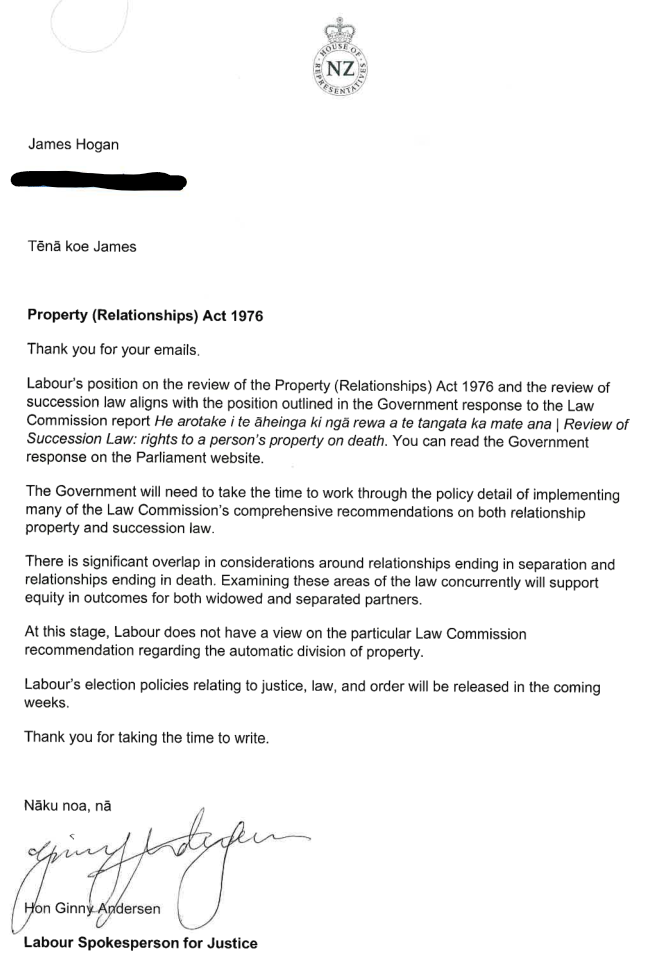Responses
First response in from ACT
Does ACT have a view on the Commission’s opinion around a 50-50 split, and would it seek to implement the Commission’s advice in the elected new parliament?
ACT has not formed a position on the 50:50 split as advocated by the Law Commission in 2019. We realise that it is a difficult issue for many people, and that it is becoming more pointed as an aging population means people are remarrying with significant family assets from a previous marriage.
Paul
Paul Goldstone | Director Policy and Research
ACT Caucus Support Centre | Parliament Buildings, Wellington
Secondly, from TOP
Hi James,
Thanks for reaching out.
It sounds like your brother was in a very difficult situation – our sympathies with him.
TOP has no plans to campaign on or propose changes to the Property (Relationships) Act 1976. It is our belief that:
- Usually, in a relationship each partner brings a huge amount of non-financial contributions to the partnership.
- Prenuptial Agreements signed between two consenting parties at the beginning of a relationship should be considered if there is a significant assets discrepancy.
Ngā mihi,
Christopher JoycePolicy Coordinator
The Opportunities Party
From the National Party:
Hi James,
Thank you for your email.
As you can imagine, the party is currently undertaking an exhaustive and extensive amount of work formulating thorough and fully-costed policy documents in the lead up to the election.
I have been informed we currently do not have a set position on this exact Law Commission recommendation, so you will appreciate that I do not wish to speculate on what our position may be without possessing that knowledge. If this happens to change in the next few weeks I will make sure to make you aware of the detail.
Alternatively, if a position is not reached before the election, the party will make sure to be consultative and thorough if making any changes based on the Law Commissions recommendations once reaching government.
Kind regards,
Jo Irain | Communications, Research and Policy Advisor
Office of Chris Penk, MP for the Kaipara ki Mahurangi electorate
Senior Whip, National | Shadow Attorney-General | Courts spokesperson (National)
Cyclone Recovery spokesperson (National) | Associate Justice spokesperson (National)
Parliament House | Parliament Buildings | Wellington | New Zealand
From Labour:

Follow up emails
14 August
Hi XXXX,
I emailed you on the 3rd of this month wondering about XXXXs policy position on the Review of the Property (Relationships) Act 1976 (see below).
I was wondering if you’ve had a chance – or will have a chance – to reply before the election? Please let me know.
Best regards,
James Hogan
Sent to Labour, National, TOP, Greens, Maori Party and New Zealand First on 14 August
29 August
Hi XXXX,
I emailed you on the 15th of this month wondering about XXXXs policy position on the Review of the Property (Relationships) Act 1976.
The Law Commission consider that the full value of the family home should no longer be treated as relationship property. Only an increase in the value of the family home should be treated as being attributable to the relationship and classified as relationship property.
Would Political Party X implement the Law Commission’s advice in the elected new parliament?
Best regards,
James Hogan
Sent to Labour, Greens, Maori Party and New Zealand First on 29August
I’m Out of Date
Both ACT and National have pointed me towards the Law Commission’s 2019 report.
DIVIDING RELATIONSHIP PROPERTY
38. A cornerstone of the PRA is that, on division, each partner is entitled to share equally in the relationship property. We think this rule should continue. Equal sharing is easy to understand and simple to apply. It is also consistent with public attitudes and values and is familiar to many people. Repeal of the equal sharing rule would be a radical shift in policy that we do not think is warranted.
39. There are limited exceptions to equal sharing. When a court considers there are extraordinary circumstances that make equal sharing repugnant to justice, it can order that the partners’ relationship property be divided based on the partners’ respective contributions to the relationship. We think this exception should continue to address truly extraordinary cases where a just division of property would not be achieved if the equal sharing rule was applied.
However, on Page 13, the Law Commission notes normally the largest relationship asset should no longer be a relationship asset:
9. The PRA’s definition of relationship property includes the home and chattels the family used during the relationship, regardless of which partner owns them, when they were acquired or the source of the funds used to acquire them. We consider that this “family use” approach to classifying relationship property can result in unjust outcomes if the property was owned by one partner before the relationship began or if it was received by one partner as a third party gift or inheritance during the relationship.
10. We consider that the full value of the family home should no longer be treated as relationship property just because it was used by the partners during the relationship.
Instead, property should be treated as relationship property if it was:
(a) acquired by either partner for the partners’ common use or common benefit; or
(b) acquired or produced by either partner during the relationship, excluding third party gifts and inheritance
…
13. In some situations, an increase in the value of separate property will be attributable to the relationship and should therefore be treated as relationship property. This includes when separate property is used as the family home. In that case, any increase in the value of the home should be treated as being attributable to the relationship and classified as relationship property. This recognises that the home is a key family asset that has financial, emotional and practical value to the partners and recognises the likelihood that both partners will have directly or indirectly contributed to the preservation and improvement of the family home for the benefit of the family joint venture.
So, yeah, I’m still all good about asking these guys their plans around the Law Commission’s advice.
Overview
New Zealand’s political process is a bit like the old Its In The Bag show. Some well-suited game show host tries to entice you, the voter, to choose the money, or the random thing “in the bag”.
The money looks good (be it spent on health or more cops), but what’s really in the bag?
Could it be another Te Paupau Report? Or a commitment to plant a billion trees? Or a completely rando’ health sector reform which differed from the expert recommendations, and is straight out of Gosplan.
You never know what you’re going to get when you vote because the policies the country actually gets, gets hammered out in coalition negotiations after the voting has finished.
And while one party might get the most votes, like National did in 2017, “King Maker” parties might put the other into power. And then you get a completely different set of policies.
My Pet Legal Beef
For a long time, I’ve had a bee in my bonnet about the Property (Relationship) Act 1976.
Background to my Beef
See, a while back one of my brother’s was in a relationship with an alcoholic nutter of a chick. When their relationship inevitably soured, he slept in a shed out the back of the house and she slept in the house, ruling the roost.
She used to come home drunk at night and beat him while he slept in the shed. And the next day, every time it got discussed, she swore that if he ever left her, she’d take half of everything he had.
And my brother supplied and paid for everything. This lady brought nothing to the relationship. The house was his, the appliances were his, and the income that paid the bills was his.
They were an older couple, they had no children from the relationship. She neither gave up anything for the prosperity of the relationship, nor contributed to the mortgage or cost of the relationship.
In every sense, the relationship was funded in one way, and she had the temerity to blackmail him using the 50-50 default split.
What Happened?
He could only take so much, and he threw her out. And true to her word, she took him successfully for half.
Such is the power of the default equal split rule, even when he contributed 96% of the assets and all of the income of the relationship, she took half.
There was inequality, but it has to be “repugnant to justice” before the equal asset splitting rule could be reconsidered by the courts.
The bar is very very high. And that also creates a financially very high cost in legally arguing such a high standard.
What’s in the Political Bag?
The equal sharing assumption has been reconsidered by the Law Commission, back in 2016. However, neither National at the time, nor Labour since have chosen to adopted the Commission’s recommendations.
So I’ve decided to ask them, and I’ll post their responses on this website.
Asking the Parties
The question I’ve asked the ACT, National, Labour, Green, Maori, TOP and New Zealand First party’s is:
Hi Politician X,
Email to ACT, National, Labour, Maori Party, Green Party, New Zealand First, and TOP
Just looking around asking about where each party sits on the Review of the Property (Relationships) Act 1976 before the general election.
In 2016 the Law Commission released a review of the distribution principles governing property on the dissolution of a long term relationship:
https://www.lawcom.govt.nz/our-projects/review-property-relationships-act-1976
Specifically, the Commission sort to move away from an automatic 50-50 split of relationship property.
Does Political Party X have a view on the Commission’s opinion around a 50-50 split, and would it seek to implement the Commission’s advice in the elected new parliament?
Best regards,
James Hogan
I’ll post the responses, as they all roll in!
… or not roll in. Let’s see what happens
I’ve made this posting “sticky” so it stays at the top of the page until either all the parties respond, or we hit the general election date.


